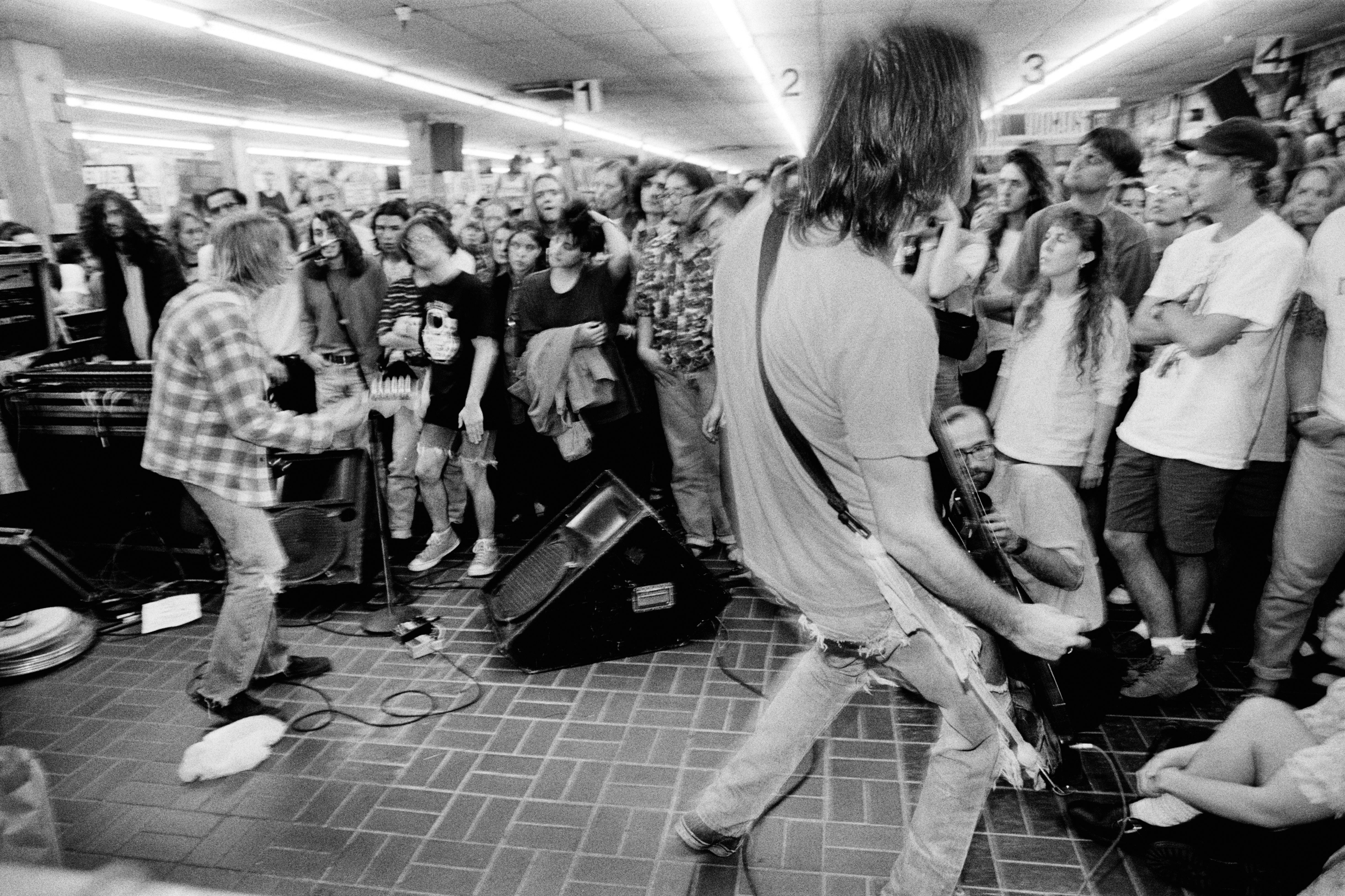
Cody Chhun Defies the Odds
It's a full house at Washington Hall—750 people crammed into this historic ballroom, but it feels like the entire city. The wooden floors beneath me creak as I settle into my seat, the room’s rich history echoing off walls adorned with civil rights posters and wrestling memorabilia.
This is what I’d imagine a pre-mainstream Nirvana concert at the Central Saloon would have felt like in the late ’80s. The small, intimate venue heightening the sense of unity among attendees, creating a communal bond. We’re in on a secret, but it’s a secret that we know won’t be ours for long.
That secret is the magic of Defy Wrestling, the local business that has become one of America’s most innovative pro wrestling promotions. Washington Hall has been Defy’s home base since it was founded in 2017 by Jim Perry and Matt Farmer, who are celebrating the company’s seventh anniversary show. It features a card stacked with both nationally recognized wrestlers and rising local talent, setting the stage for a memorable night.
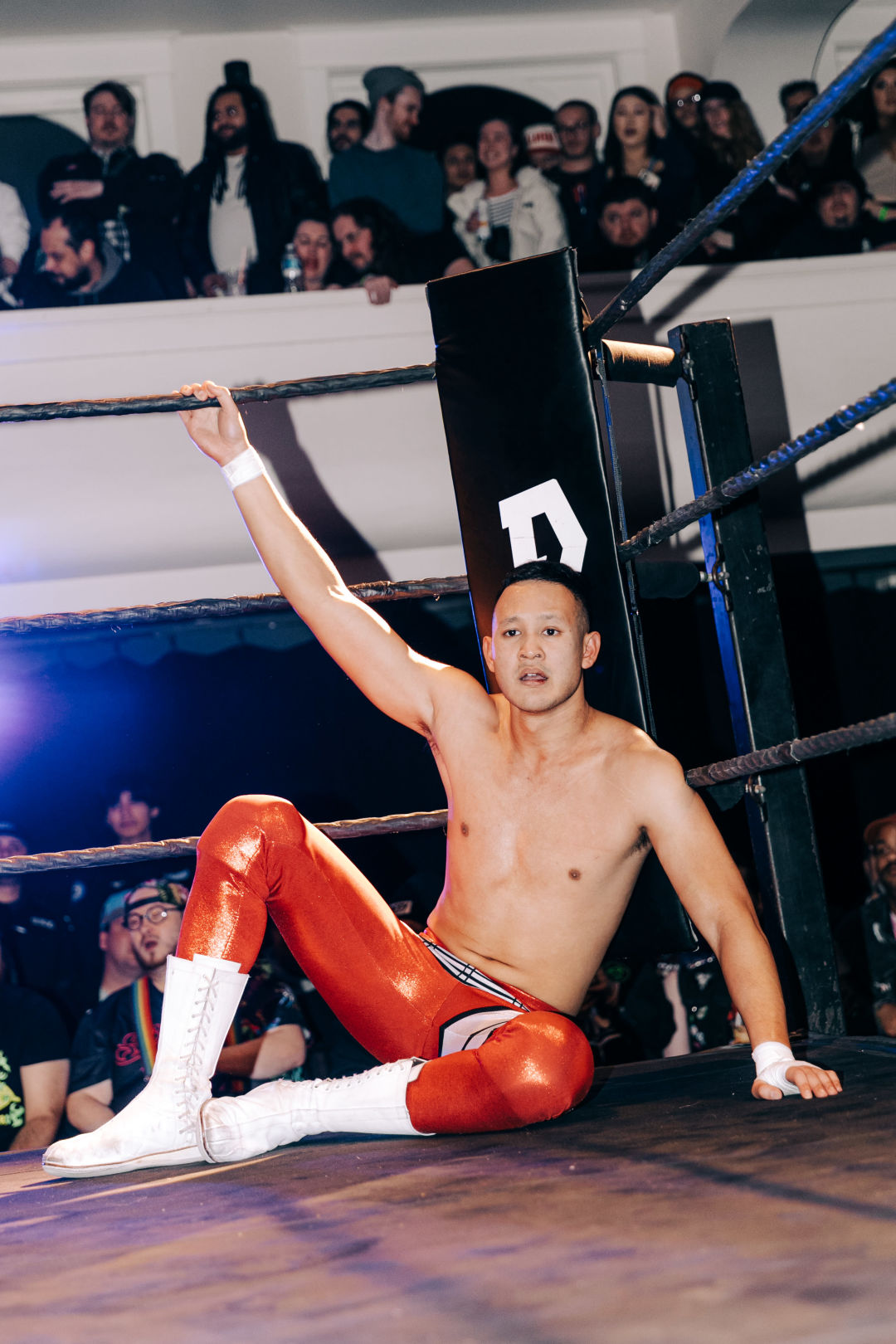
Image: David Jaewon Oh
Among the local wrestlers is Cody Chhun, 27, defending his PrimoLucha International Champion title in a six-man tag-team match. The crowd’s roar reaches a deafening crescendo as Chhun makes his entrance to Duke Dumont’s “Ocean Drive.”
Determination is etched onto his face. He ascends the turnbuckle and strikes a pose for the audience. They erupt into chants, the words echoing and filling the arena.
“Cody, Cody, Cody fucking Chhun!”
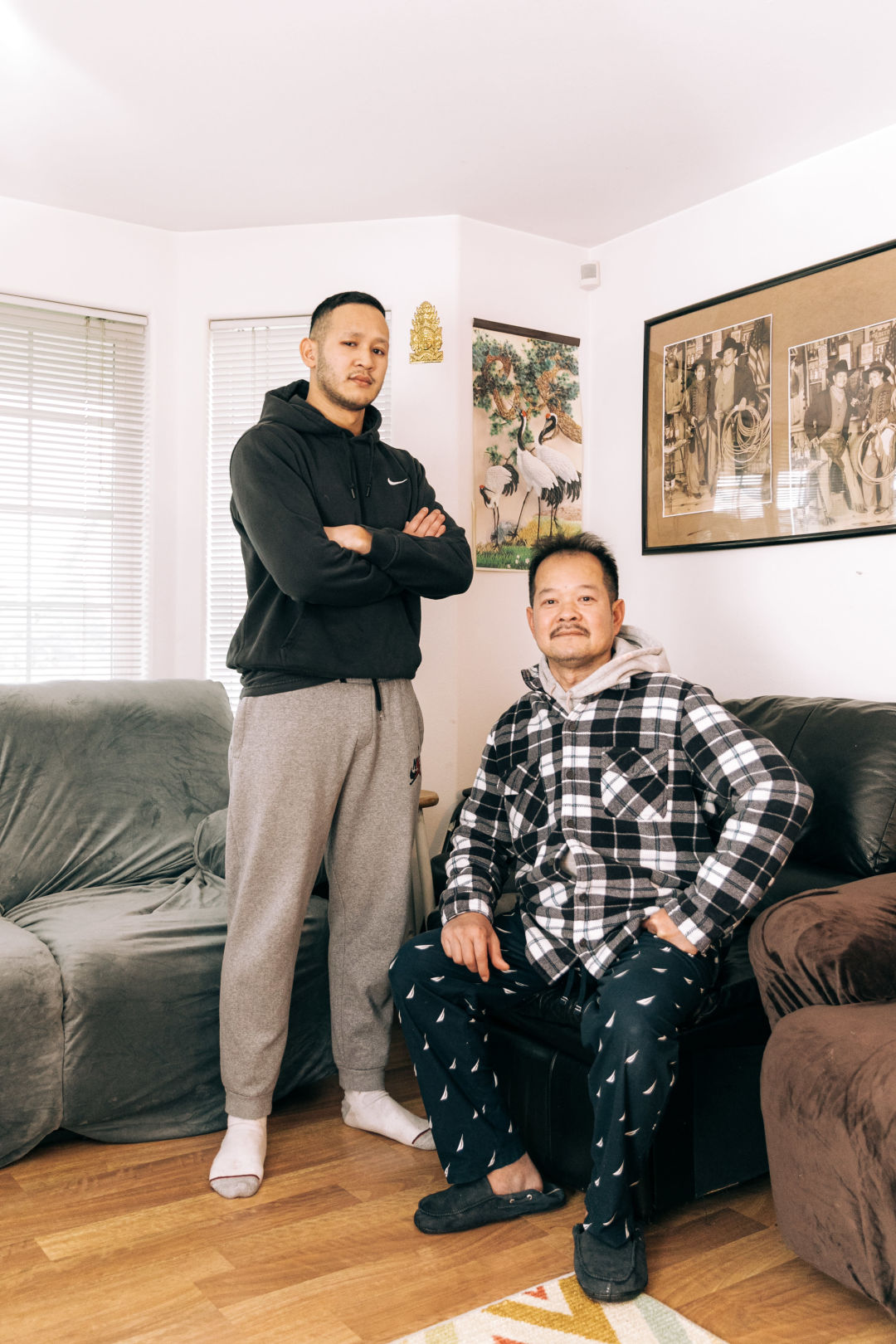
Image: David Jaewon Oh
A couple days before the show, I sat with Chhun in the small home in SeaTac where he grew up and still lives with his mom and dad. The first time I saw a wrestler up close was at a Kmart meet and greet for WWE star Rikishi back in 2001 on Oahu. This was the second.
It turned out we had more in common than I expected: as first-generation Asian Americans, navigating the expectations set by our parents of pursuing careers more traditionally aligned with the American dream; as kids who enjoyed Dragon Ball Z and WWE a little too much and math homework a little too little.
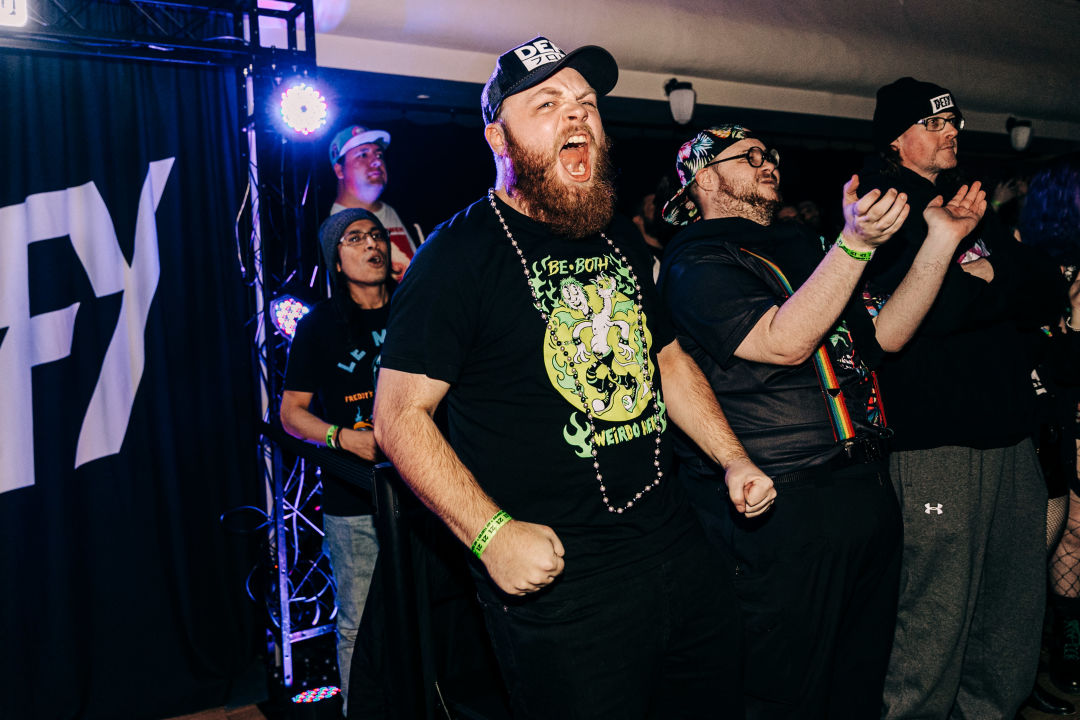
Image: David Jaewon Oh
I was just 2 years old when Yokozuna beat Bret Hart at Wrestlemania in 1993, a historic moment marking the “first Asian wrestler” to claim the World Heavyweight Championship for WWE, back when it was known as the World Wrestling Federation. I use quotations because while Yokozuna was portrayed as a Japanese sumo wrestler, he was in fact Samoan. Fast-forward over three decades, and the prestigious championship belt has been held only by one other “Asian wrestler,” the Great Khali from India.
Cody Chhun is aware of this history, aware of the fact that his sport has a legacy of turning wrestlers’ ethnic and cultural backgrounds into plotlines that exoticize them as villains, and a legacy of disregarding wrestlers whose bodies don’t fit the classic massive stereotypes. He would like to challenge these legacies, he tells me. That starts with embracing his own Cambodian heritage—and getting his parents on board with a nontraditional career choice.
“My parents didn’t really know I was wrestling for a while,” says Chhun, his voice tinged with a mix of defiance and understanding. His parents, survivors of a tumultuous past in Cambodia, found solace in the suburbs, believing in the power of education for their kids. Yet, Chhun had a different vision etched in his heart. His parents—who had fled a violent genocide—didn’t necessarily understand the appeal of suplexes and bloodstained mats.
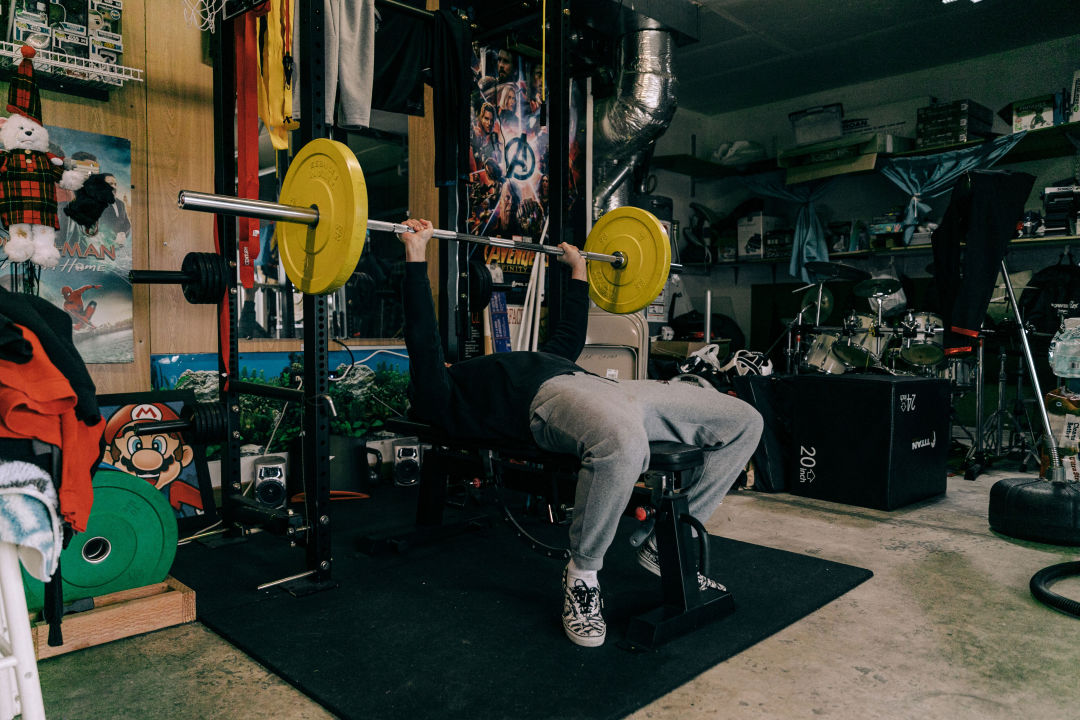
Image: David Jaewon Oh
Darozyl Touch is assistant dean for diversity, equity, inclusion, and justice at Seattle University. Her own work as an educator and organizer stems from her family’s experience as refugees of the Khmer Rouge genocide. She says it’s important to understand that context when it comes to understanding the mindset of her and Chhun’s parents’ generation.
“The American dream for them meant owning land, as many of them lost their land back home,” she says. “Their expectations for us are rooted in their sacrifices and the hope for a better future.”
Chhun and I talked before the big Defy show in the garage that doubled as his makeshift Gold’s Gym. Star Wars Funko Pop characters were stacked on one side of the squat mat, while an Avengers poster, swiped during his tenure working at the Southcenter AMC movie theater, hung on the opposite wall.
Chhun was fresh off a 10-minute session at the tanning salon. As we sat on separate weightlifting benches discussing his rigorous training routine, he chugged down 220 grams of protein in two huge gulps. He believed he was still way too small to make it as a big-time wrestler. To me, he seemed plenty big.
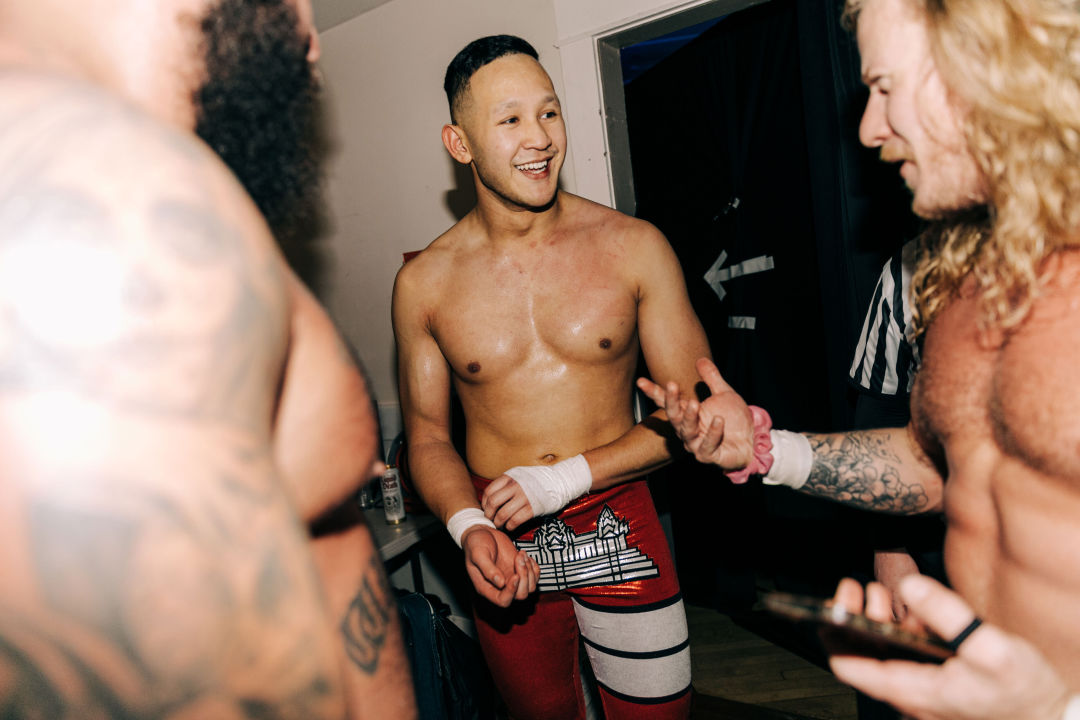
Image: David Jaewon Oh
Wrestling with the industry’s perception of size and physique, Chhun acknowledged the pressure to conform and overcome his own body dysmorphia. The current age of wrestling features fewer steroid bodies and more high-flying luchador type performers. But Chhun told me he always wanted to be that wrestler who made folks pause while flipping through channels and be like “Whoa, look at this guy.” They teach you in wrestling that you have a three-second window to get people’s attention, he explains. He wants to be the person who makes you stop.
The question was how to do that without losing sight of who he already was.
Unless your last name is Flair, Rhodes, or Fatu, if you want to be a pro wrestler you are going to have to start at the bottom. Chhun’s journey into the sport began humbly, making popcorn and selling candy to save money.
Chhun loved watching WWE as a kid. His grandfather would tape episodes of Monday Night Raw for him. But the real obsession would not develop until later.
“Working at the movie theater was my routine for eight months after high school. Everyday. Lots of time spent at Southcenter mall,” he says.
The first few months working at the AMC, he did what most teenagers would do: take advantage of the free screenings of his favorite movies. But soon, he instead began taking advantage of his time off in the employee break room by watching YouTube clips of popular indie promotions like New Japan Wrestling. These promotions were on the cutting edge of the sport.
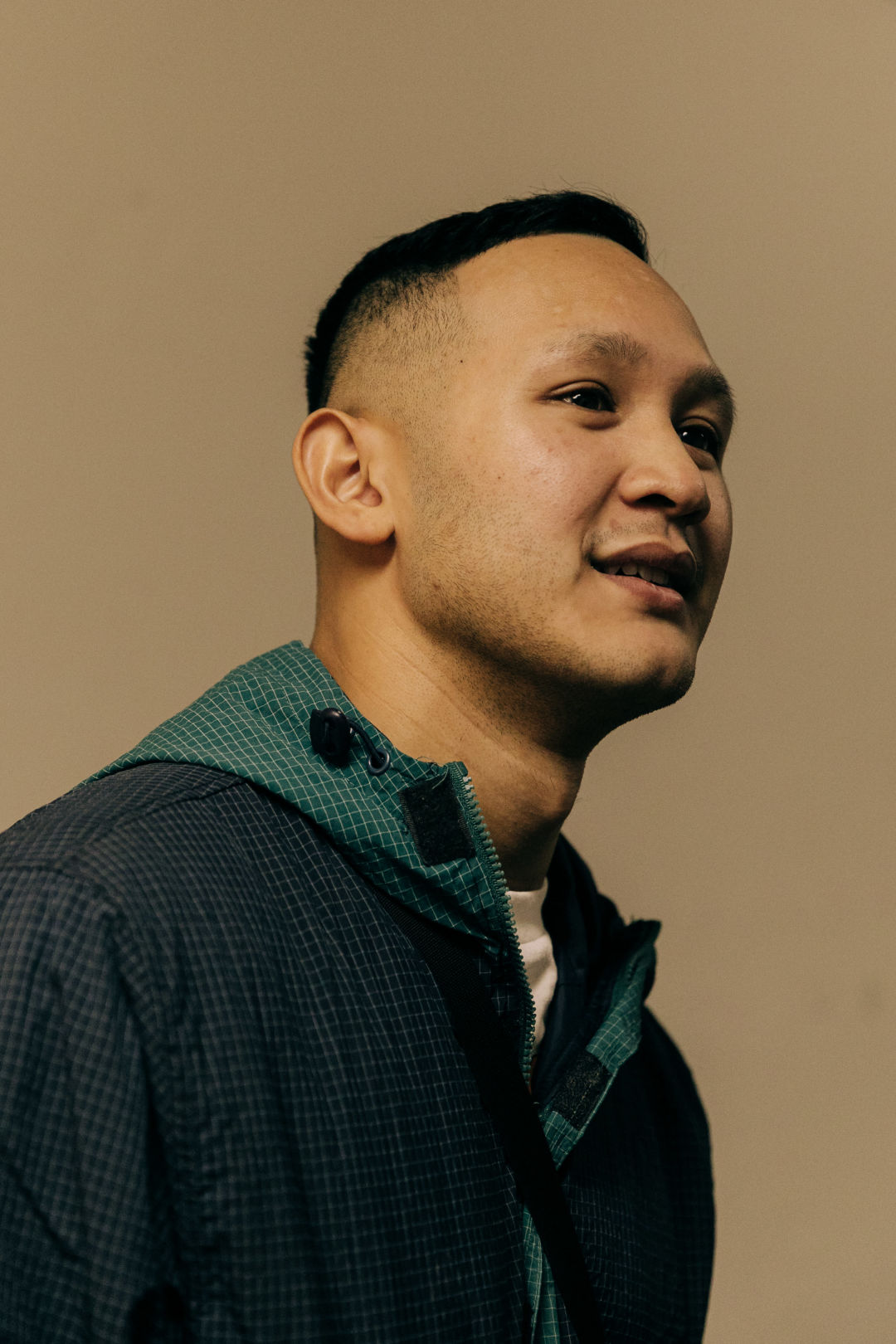
Image: David Jaewon Oh
In October 2016, Chhun and a high school friend embarked on a quest to find a wrestling school good enough to help them achieve their dreams. “We found the Buddy Wayne Academy, but the website hadn’t been updated since ’06 or ’05,” says Chhun. “I thought it might not even be active anymore.”
Was it a scam? Had it already been shut down? Despite the uncertainty, their determination led them to Everett. It turned out the Buddy Wayne Academy had been the leading wrestling factory in the region for decades. Chhun knocked on the front door and was greeted by an older gentleman with a firm handshake.
The great Buddy Wayne and the wide-eyed Cody Chhun began their partnership right then, practicing three times a week—Wednesday, Thursday, and Saturday—until 2017, when Wayne passed away, leaving Chhun as one of the last wrestlers to be trained by the local legend. All of it, at the time, without the knowledge of Chhun’s parents.
The first time I arrived at the family home in SeaTac, his father, Andy, had just pulled into the driveway. Despite the fatigue evident in his posture, he greeted me with a warm smile, grabbed a beer, and invited me inside.
“So, what can you tell me about Cody’s wrestling?” I asked.
His expression shifted slightly, a mixture of contemplation and hesitation. “Honestly, I’m not too sure,” he said. “I’ve never been to one of his matches before. It’s too scary.”
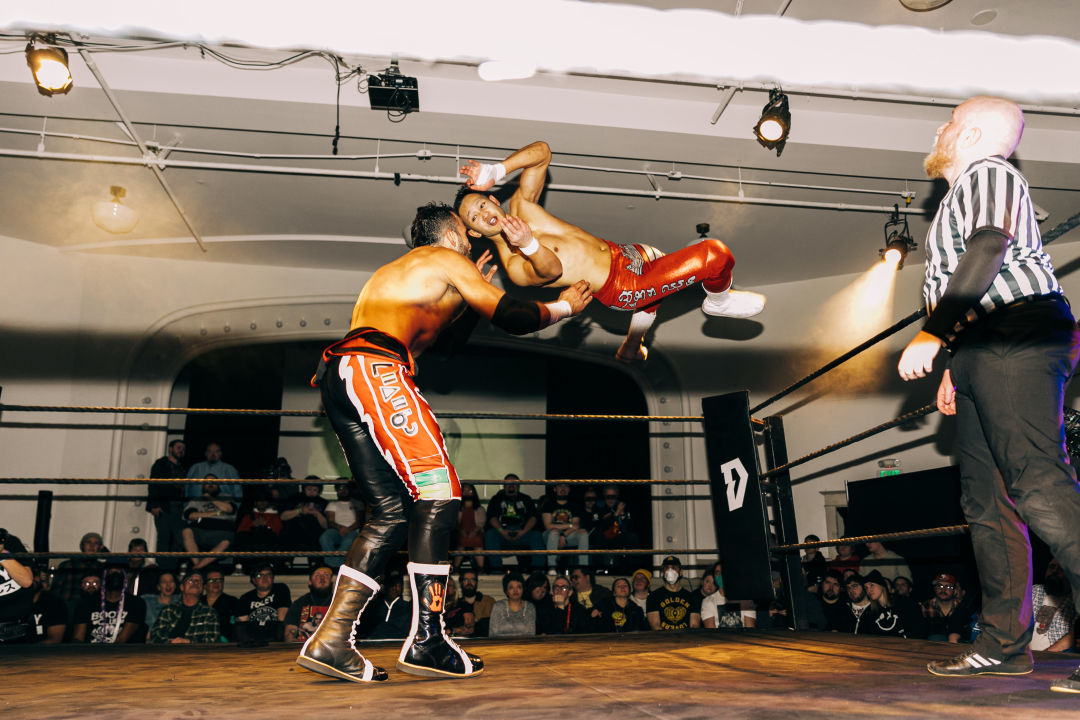
Image: David Jaewon Oh
The admission hung in the air, a poignant reminder of the divide between Chhun’s world of wrestling and his family’s understanding of it. Yet, despite this disconnect, there was an undeniable sense of admiration in his father’s tone as he continued to speak.
“My son’s passion for wrestling is undeniable, I’ll give him credit. But it’s hard for us to shake off the fear. It’s risky, the injuries. We trust his abilities, it’s just...it’s a parent’s instinct, you know? We’re just afraid of seeing him hurt,” his father said.
“I couldn’t get a nice job when I was your age,” his mother, Kimleang, would remind him when he was first starting out. But Cody, the youngest of the family, wasn’t prepared to let go of the dream. “Let me just focus on this right now,” he would tell her.
Right now, Chhun is holding onto it as tight as he can. His title defense is underway. The echo of the mat resonates through the hall, a thunderous applause following each move—especially the high-flying ones. Most people assume these matches are fully rehearsed and scripted from beginning to end. But although the wrestlers go over certain spots, specifically the ending, matches are mostly improvised.
The intimate setting in Washington Hall allows every grunt, slam, and cheer to be felt on a visceral level. The crowd, a sea of diverse faces, from kids at their first wrestling match to old heads who remember the sport back when regional promotions like Defy were the norm—before WWE took over the world—erupts with each thrilling signature move, their cheers merging with the pulsating beats of the entrance music of their favorite performers. Fans united in passion in the way that only live performance, whether art or sport or both, can create.
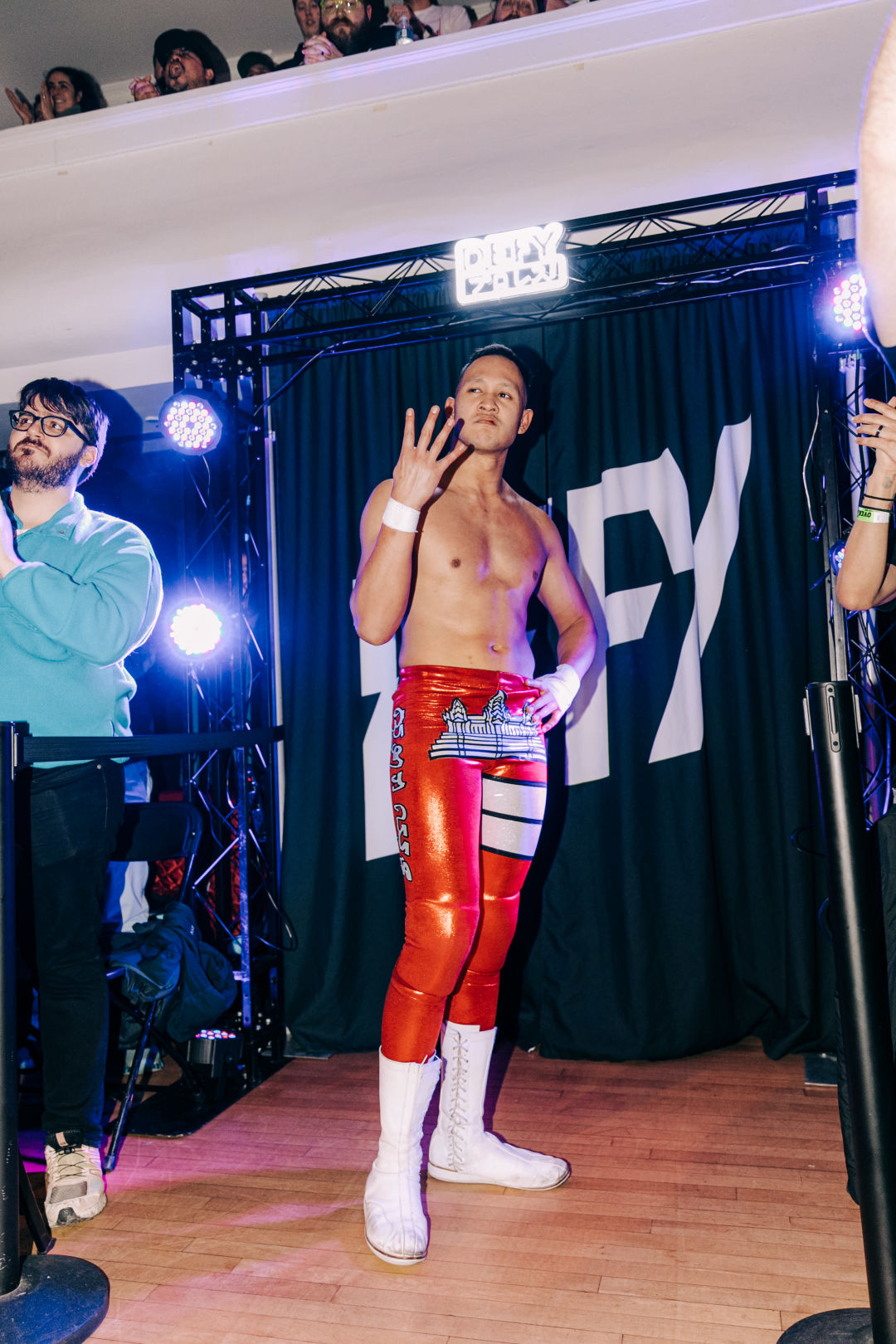
Image: David Jaewon Oh
One of the men behind this particular phenomenon, Jim Perry, cocreator of Defy, also hosts a podcast about paranormal experiences, called Euphomet. Wrestling, much like the enigmatic tales explored on Euphomet, requires a willingness to embrace imagination and straddle the line between reality and the fantastical, especially for adult fans.
Perry’s exploration of the unknown has shaped the unique atmosphere at Defy. Unlike typical wrestling fandoms, members of the “Defyance” describe going to monthly shows at Washington Hall as their “church attendance.” It is a welcoming community where the love for the product unites fans, transcending the need to justify the enjoyment of a “fake” sport. At Defy, the dedicated group of wrestling enthusiasts finds solace, understanding, and a shared passion that goes beyond the ring.
But this particular show is not just a wrestling extravaganza and anniversary party. It’s a celebration of Defy’s merger with Progress Wrestling. Announced on this night, the collaboration promises not only local impact but a worldwide presence, and the Defyance—as well as the wrestlers—could sense they were witnessing a pivotal moment. This fusion of two prominent independent wrestling promotions will mean more opportunities for their rosters to showcase their skills worldwide. With Progress originating in the United Kingdom, Chhun’s dream of wrestling on international platforms seems on the verge of realization.
But first he has to stay healthy—and try to make it through this match with his title belt still in hand.
Before the fight, Chhun persuaded his father to write down his legal Cambodian name on a piece of paper for the costume designer to inscribe onto his new tights. The tights are bright and shiny red and under the lights above the ring, the bold Khmer script stands out down his leg.
The significance of this personal touch not only speaks to Chhun’s pride in his cultural roots but also serves as a symbolic bridge between the family that raised him and the world of professional wrestling where he is making his life.
“It’s tough not having him around on weekends like we used to,” says Andy Chhun. “Our family gatherings, our Cambodian traditions, he’s missing out because of wrestling. But I guess that’s the sacrifice he’s making to pursue his dreams.”
Cody Chhun also knows that his family have sacrificed as well—shielding him from street fights and gang wars that have plagued the Cambodian community, including some of his own relatives.
“The gangs, predominantly Khmer but diverse, formed as a response to societal marginalization,” says Touch, the dean at Seattle U. “Many youths, disconnected from their heritage and struggling with trauma, fell victim to drugs and violence. Our communities continue to suffer from historical erasure and systemic neglect, affecting access to education, mental health resources, and social mobility.”
Chhun appreciates that some of the uncles who got wrapped up in gang violence also protected him from it, making it possible for him stand apart and pursue his dream. “I didn’t want any fucking part of that,” he told me in his garage.
“I really want to just be able to call myself a full-time wrestler and have that as my main source of income,” he says. “I want a wrestler’s schedule. I want to move out of my parents’ house. The ideal life is travel Tuesday, TV Wednesday, come home Thursday. That sounds pretty good to me. And I want to be with a personal trainer to get my body looking professional.”
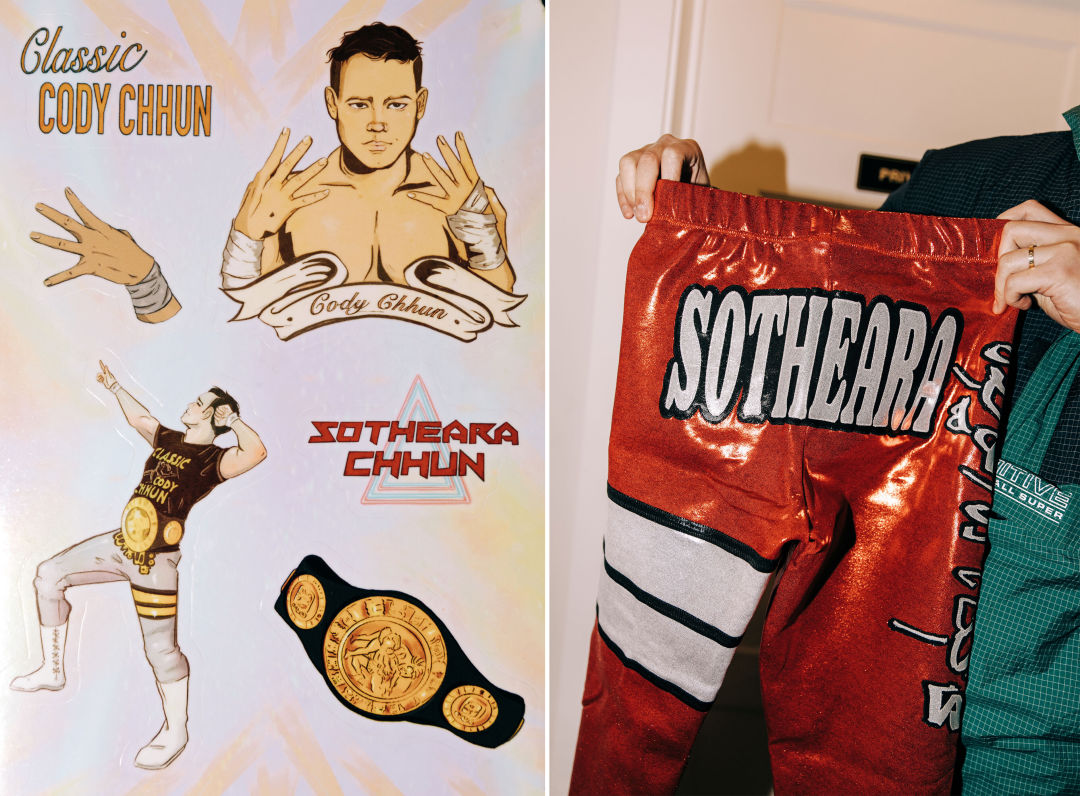
Image: David Jaewon Oh
The climax of his title match unfolds dramatically, with a surprise opponent emerging at the end, injecting an unexpected thrill into an already intense contest. It’s Chhun’s best friend and usual tag-team partner, Guillermo Rosas, who executes a sneaky roll-up pin on him to steal the belt. Wrestling at its melodramatic finest.
And to the fans watching, it doesn’t matter in the slightest that Chhun has lost the belt. What matters is the adrenaline, the emotion, the feeling of being 12 years old again, lost in a world of suspended disbelief. It’s not winning a scripted match that makes you a star—it’s making people feel something.
The fans tell Chhun that they’re going to see him on TV one day. And he always shrugs it off. He sure hopes so. And he’s trying. But first, he has to get signed full-time. The ideal places would be WWE, All Elite Wrestling, or New Japan Wrestling, the three biggest global wrestling brands, but there are a small handful of other promotions that provide stable enough salaries to help young wrestlers like Chhun get by.
In the meantime, he is under contract at Defy, wrestling frequently around the Seattle area, building up his persona in addition to his skills. “I don’t take that for granted,” he says. “Every time we wrestle, everyone in that locker room, we wrestle like this is our last fucking match here.”
Chhun is always thinking about his body, his technique, his showmanship. A hundred pushups before every match. In the ring, there are a million things going on in his head: footwork, posing, his next spot. But on the outside, he has to be stone-faced. “Timing is key, pacing is crucial.” And of course, “the ending’s the most important thing,” he says. That’s what everyone remembers.
The world has changed since Yokozuna beat Bret Hart at Wrestlemania. Wrestling isn’t just WWE anymore. The sport has room for more promotions, and more voices. A wrestler’s identity doesn’t just have to be a gimmick—it can be something profound.
Chhun shared with me that he plans to incorporate his Cambodian culture even more into his wrestling persona. Perhaps by wearing the traditional demon masks or bringing in the dances of his ancestors. The next step is going to be wrestling under his legal first name, Sotheara. The same name his father just wrote out for his new wrestling attire, shining bright on his fresh red tights.
